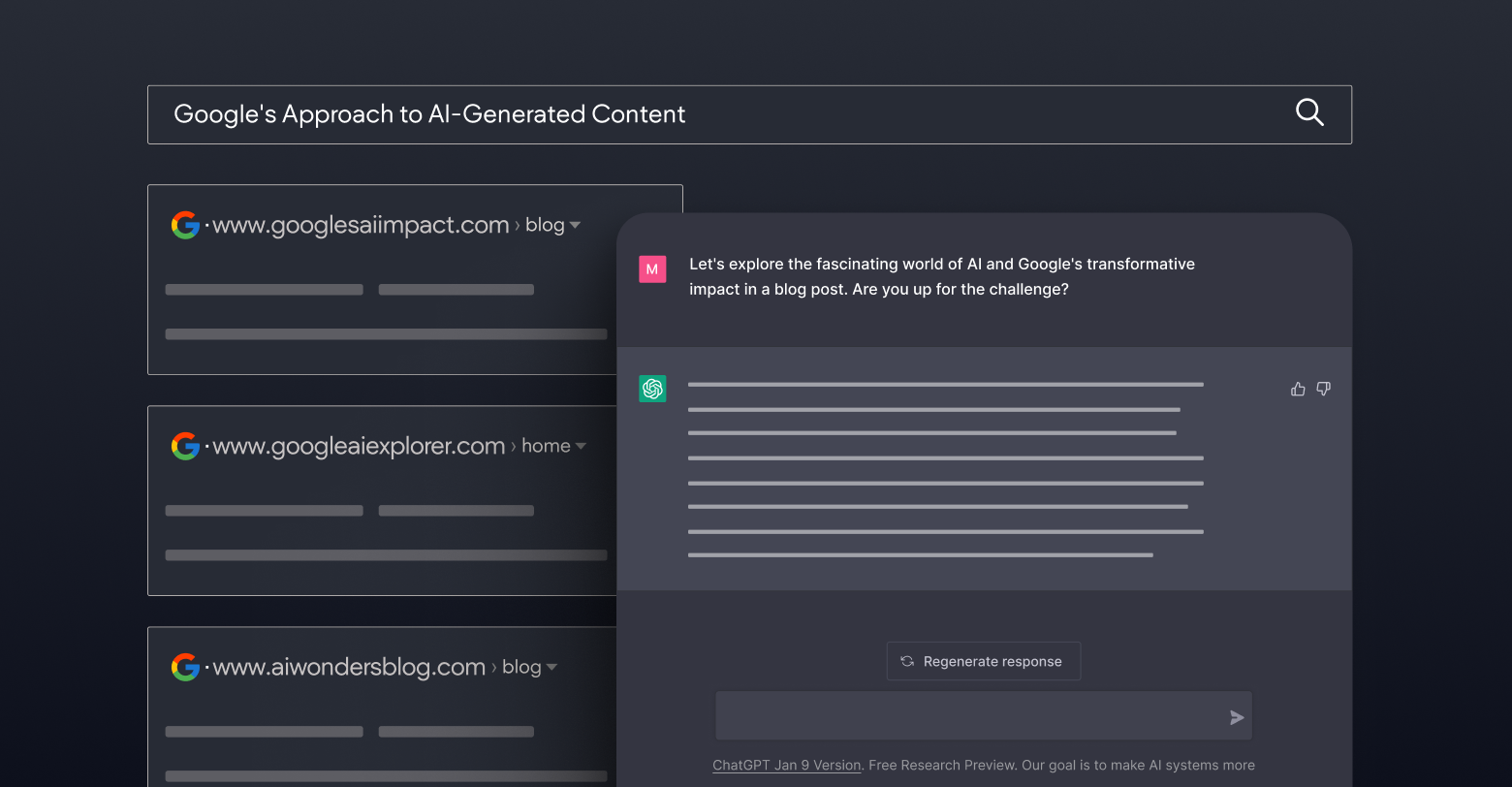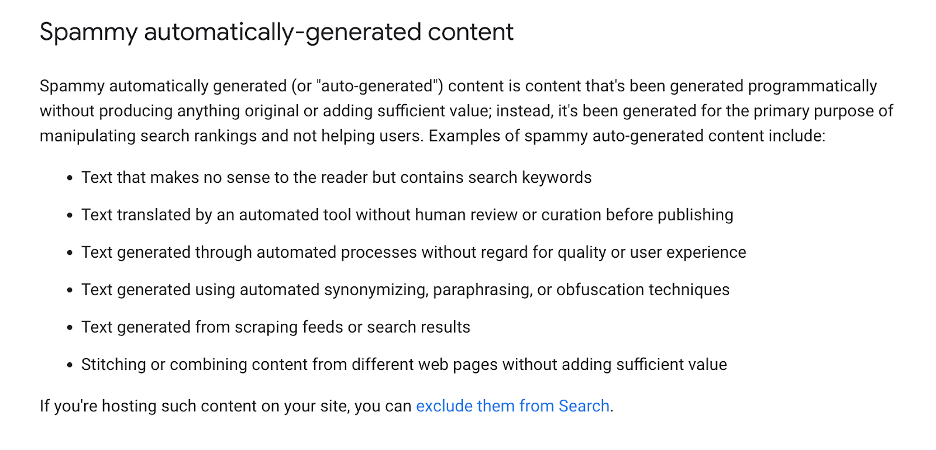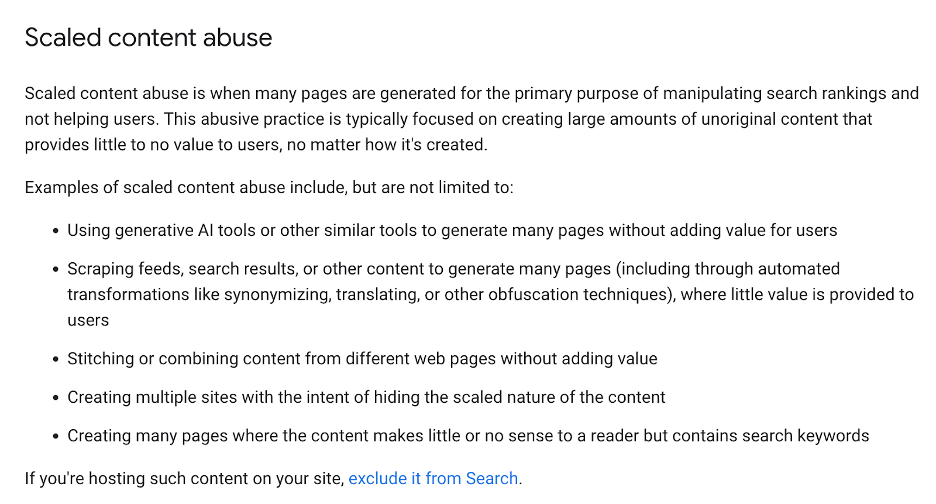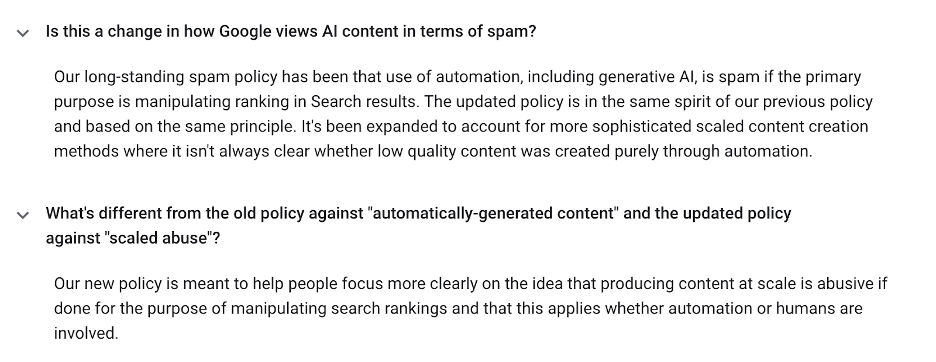If your agency had a dollar for every time the question of how Google treats AI-generated content came up, you wouldn’t need clients, right?
AI-generated content has been a hot topic these past two years, and this question comes up frequently. It's the kind of query that makes you wish you had a crystal ball, a direct line to Google's algorithm engineers, or at the very least, a hotline to John Mueller's office. It's as sensitive as asking someone about their favorite conspiracy theory - touchy, complex, and likely to lead to a spirited debate.
This article will summarize the latest guidance from Google to help you answer the complicated question of Google’s approach to AI-generated content and will equip you with the knowledge needed to address client concerns without tiptoeing around the topic nervously.
Is AI-generated content “spam”?
If you’re struggling to keep pace with Google’s approach to AI-generated content, it’s not your fault! Google's communications on AI content have largely been vague and have evolved rapidly, but reading between the lines reveals a shift since the big boom of ChatGPT in 2022.
During the 2022 April first
Google Search Central SEO office-hours hangout, Mueller called AI-generated content “spam” that violates Google's Webmaster Guidelines and is subjected to penalties, emphasizing that the search giant frowns upon content generated by AI.
From that statement (and assuming Google can tell the difference between AI-generated content and human-generated content), you would think that you should avoid AI-generated content, right?
Indeed, many articles written after that “spam” statement warned about using AI-generated content. To name a few:
However, in the same April 2022, Google changed its Webmaster Guidelines (now
Google Search Essentials) from instructions to avoid “Automatically generated content” to instead say “Automatically generated content intended to manipulate search rankings.” That’s quite a change!
Just for reference, up until recently, the
Google Search Essentials spam policies defined spam in the following way:
Notice the “without regard to quality or user experience.” This is a big tell on Google’s direction regarding AI-generated content, with quality being the focus.
Google’s latest extensive March 2024 Core update, announced in a
blog post, takes another stab at low-quality content created for search engines:
“This update involves refining some of our core ranking systems to help us better understand if webpages are unhelpful, have a poor user experience or feel like they were created for search engines instead of people. This could include sites created primarily to match very specific search queries.”
The blog post also includes a warning or a hint to a significant drop in ranking (40%!) to come for ‘unoriginal’ content:
“Based on our evaluations, we expect that the combination of this update and our previous efforts will collectively reduce low-quality, unoriginal content in search results by 40%.”
Google also refreshed its spam policies, so notice the “Scaled content abuse” section warning about using AI tools to generate large-scale content
“without adding value”:
Google discusses this change in spam policies in another blog post, confronting and directly answering the question of how Google treats AI-generated content:
Again, as Google says, it’s in the same spirit as the previous spam policy, meaning there’s no direct call to avoid using generative AI, but rather to avoid using it if the purpose is to manipulate ranking.
“However it is produced”
If you look at
Google Search's guidance about AI-generated content from about a year ago (Feb 8th, 2023), Google recognizes that “not all use of automation, including AI generation, is spam.” and rewards quality content
“however it is produced.”
Now, you would think that you shouldn’t stay away from AI-generated content as long as it’s quality content and not a parade of keyword-stuffed gibberish, right?
Well… Basically yes! Or as
Search Engine Land described it: “Google does not penalize AI content. It penalizes poor content.”
Catching up on some reading
If you’re seeking a more in-depth, chronological look at Google’s approach toward AI-generated content, as it is portrayed by various publications - here’s a list we’ve prepared:
- Mar 5, 2024:
Google March 2024 Core Update: Reducing “Unhelpful” Content By 40%
- Mar 5, 2024:
Google takes aim at SEO-optimized junk pages and spam with new search update
- Jan 19, 2024:
Google Responds To Claims Of Google News Boosting Garbage AI Content
- Dec 31, 2023:
Beyond SEO: John Mueller On AI-Generated Images & Stock Photography
- Dec 21, 2023:
Google’s shifting approach to AI content: An in-depth look
- Dec 14, 2023 -
Does AI Content Rank in Google?
- Dec 10, 2023 -
Google to join industry mechanism to discern AI-generated content
- Nov 24, 2023 -
Mind-Blowing Proof: Undetectable AI-Generated Content
- Nov 16, 2023 -
Google’s New Rules for AI-Generated Content Mean More Headaches for Creators
- Oct 16, 2023 -
Does Google’s helpful content update penalize AI content?
- Sep 19, 2023 -
Google Updates Its SEO Playbook for Content Generated With AI
- Sep 4, 2023 -
Google can now detect AI-generated images, here’s how
- Sep 4, 2023 -
Should You Use AI to Write Content? Google’s John Mueller Provides His Perspective
- Aug 15, 2023 -
Google: If You're Using AI To Write Your Content, It's Going To Be Rehashed From Other Sites
- Aug 15, 2023 -
Google Senior Search Analyst John Mueller Says AI Content is Rehashed from Other Sites: Terrible Content to Rank Much Harder
- Aug 4, 2023 -
Can search engines detect AI content?
- Jul 23, 2023 -
New Google AI Content Guidelines: Google Approves AI Content
- April 7, 2023 -
Google doesn’t want your AI-generated SEO spam content
- Apr 5, 2023 -
Google's John Mueller On Using AI To Write Content…
- Mar 2, 2023 -
Learn Google’s New Guidelines On AI Content 2023
- Jan 11, 2023 -
Google is not against AI generated content and text any longer
The answer
By this point, if you want to create content using artificial intelligence, you might be asking yourself, “What’s the right way?” You probably shouldn’t generate articles wholesale without any oversight, but there’s no reason to avoid using AI altogether either. Instead, like so many things in life, the answer lies somewhere in the middle.
This is similar to our opinion on AI in general, first shared by our CEO, Itai Sadan, in his article “Beyond the hype: what AI means for agencies.” In that piece, Itai states “[t]he reality is that while AI can be an incredibly powerful tool, it’s just that: a tool.” Using AI to generate content for SEO is very similar to using a drill to mount a television. Without a strong understanding of your tools, you may mount your television slanted or in a way that’s unstable. Similarly, without some level of competency in both content and prompt writing, your pages are unlikely to rank.
Industry experts shared this opinion too. Search Engine Journal recently wrote that “[the] synergy between man and machine ensures that the content produced is not only algorithm-friendly but also deeply engaging for human readers,” in their aptly-titled article “The Hybrid Human-AI Strategy In The Era Of Google SGE.”
One relationship you can employ with AI is a writer-editor strategy, where the AI creates content and you simply review it. However, there are plenty of other approaches you can take to create high-quality AI-generated content. You could generate outlines, conduct research, modify existing articles, and so much more. We discuss a few of these ideas in greater detail (with prompts!) in a recent article titled “The top AI prompts to use for your agency.”
Your answer should address the content rather than how it was produced. Does it add value? Is it quality content? Does it include original thoughts and information? If the answer is ‘Yes!’ then your clients are on safe ground, as far as Google is concerned.
Final note
The journey from the introduction of ChatGPT to the present day has seen Google adapting and refining its approach to AI-generated content. Through statements by key figures like John Mueller and algorithm updates, Google has consistently emphasized the importance of user-focused,
high-quality content. Content creators navigating the world of AI-generated content should prioritize user value and stay abreast of Google's guidelines to maintain a strong online presence.










